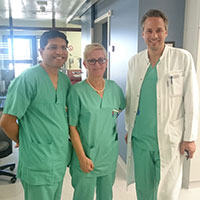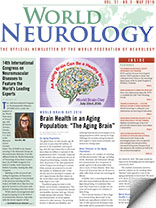
From left to right, Kalpesh Deraji Jivan, MD, Bettina Pfausler, MD, and Ralmund Helbok, MD
I was fortunate to receive funding to join the neurology intensive care unit at Innsbruck Medical University in Austria as an observer for one month in October 2015. There are no specialized neuro-ICUs in South Africa, where I am from. In South Africa’s public health care system, critical care for patients with neurological illnesses remains in the domain of our pulmonologists and anaesthetists. However, due to lack of beds in the general ICU, patients with critical neurological illness are often overlooked for admission to the ICU, and are unfortunately, left in the general neurology ward to receive basic care. This results not only in higher morbidity and mortality rates, but a sense of despair among the medical staff in not being able to deliver the best treatment.
The neuro-ICU at Innsbruck Medical University was set up in the early 1980s with the principle aim of offering rigorous neurological and neuro-rehabilitative support to acutely ill neurological patients. The unit has developed into a world-leading neurological ICU with 10 ICU beds and six step-down, high-care beds. The unit is equipped with modern mechanical ventilators and multi-modality cardiovascular, respiratory, and neurological monitoring.
Their patient population includes traumatic brain injury, subarachnoid and intracerebal hemorrhage, severe ischemic strokes, status epilepticus, neuromuscular disorders, severe central nervous system infections, brain tumors, encephalopathies (metabolic/toxic/anoxic), etc.
The unit is run by Professor Erich Schmutzhard and his team of neurological intensivists (Dr. Bettina Pfausler, Dr. Ralmund Helbok, and Dr. Ronny Beer). There are usually three to five junior doctors, including interns, medical officers, and neurology and neurosurgery resident doctors. There are approximately 60 ICU trained nurses and a full complement of allied medical personnel, including speech therapists and physiotherapists. Its monitoring capabilities are similar to that of other neurocritical care units and include measurement of intracranial pressure, cerebral perfusion pressure, brain tissue oxygen saturation, cerebral microdialysis, continuous electroencephalography, near infrared spectroscopy, transcranial Doppler and transesophageal echocardiography. The team routinely performs placement of central venous and arterial lines, continuous renal dialysis, and intravascular cooling for prophylactic normothermia and therapeutic hypothermia. Apart from clinical work, the department is very academic, dishing out leading research publications on a regular basis.
The morning starts off with a meeting with the entire neurological department discussing all neurological patients admitted in the past 24 hours and reviewing their scans. Frequently, this is followed by an academic presentation. Thereafter, the neuro ICU team has a handover round, during which the doctor covering the ICU the previous night hands over the patients to the day staff. Upon cessation of this round, the team proceeds with the actual ward round led by one of the consultants, meticulously examining each and every patient, and deciding on the treatment plan for the day. Thereafter, I would accompany the consultant to see any consults elsewhere in the hospital and observe procedures finishing in the neuro-ICU.
The experience was well above my expectations and gave me a wider understanding of the management of neurological conditions in a first world setting and how different (and occasionally how similar) it is to South Africa. I was impressed by the efficiency with which things get done in the hospital. Due to limited resources available in the public hospitals in South Africa, patients can wait up to two weeks (if not longer) for scans, whereas scans requested at the Innsbruck neuro-ICU were completed on the same day. One of the highlights was to follow patients with invasive intracerebral monitors (intracranial pressure, brain tissue oxygen saturation, cerebral microdialysis, etc). It was interesting to see how this monitoring played a role in daily management of these patients. This type of monitoring is not readily available in the public hospitals in South Africa. Another highlight was observing therapeutic hypothermia being performed on a 72-year-old woman who developed cardiac arrest in a primary hospital. She recovered spontaneous circulation after CPR. She was flown by helicopter to Innsbruck. Following the therapeutic hypothermia and neurological intensive support, she woke up a few days later with no significant neurological deficit. Upon seeing patients with severe brain pathologies recover, this visit has invigorated my enthusiasm in providing the best available care to my patients and not to give up too easily when no other resources are available.
First, I would like to thank the World Federation of Neurology (WFN) and the Austrian Neurological Society for selecting me to participate in the inaugural department visit program and to gain valuable experience. I am grateful to Professor Girish Modi for bringing the advertisement for the observership to my attention and assisting me in applying for it. I would also like to extend my gratitude to Tanja Weinhart, the executive secretary of the Austrian Society of Neurology, for arranging my flights and accommodation, thus making my stay in Innsbruck very comfortable. A big thanks goes to Professor Reinhold Schmidt and Professor Wolfgang Grisold for taking time out of their busy schedule to invite me to lunch in Vienna, and not only educating me about health care in Austria, but also adding to my waistline by spoiling me with their local delicacies. I am grateful to Professor Schmutzhard and his team for accommodating me in their department. Lastly, a big thanks goes to Dr. Bettina Pfausler for ensuring that I learned a lot about neuro-ICU. I would have to admit that I struggled with the language, as all meetings and ward rounds are conducted in German; however, Dr. Pfausler and Dr. Helbok were on hand to translate for me. Dr. Pfausler, a self-proclaimed “proud Tyrolean,” not only ensured that this observership was successful from an academic standpoint, but she also educated me on the history of the Tyrol region of Austria.
